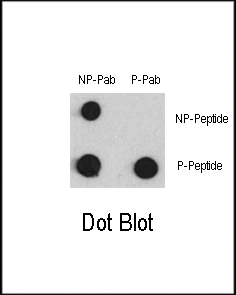
| WB | 咨询技术 | Human,Mouse,Rat |
| IF | 咨询技术 | Human,Mouse,Rat |
| IHC | 咨询技术 | Human,Mouse,Rat |
| ICC | 技术咨询 | Human,Mouse,Rat |
| FCM | 咨询技术 | Human,Mouse,Rat |
| Elisa | 咨询技术 | Human,Mouse,Rat |
| Aliases | Myocyte-specific enhancer factor 2C, MEF2C |
| Entrez GeneID | 4208 |
| WB Predicted band size | 51.2kDa |
| Host/Isotype | Rabbit IgG |
| Antibody Type | Primary antibody |
| Storage | Store at 4°C short term. Aliquot and store at -20°C long term. Avoid freeze/thaw cycles. |
| Species Reactivity | Human, Mouse, Rat |
| Immunogen | This MEF2C Antibody is generated from rabbits immunized with a KLH conjugated synthetic phosphopeptide corresponding to amino acid residues surrounding S387 of human MEF2C. |
| Formulation | Purified antibody in TBS with 0.05% sodium azide. |
+ +
以下是关于Phospho-MEF2C(S387)抗体的3篇参考文献,按文献名称、作者和摘要内容概括整理:
---
1. **文献名称**: *Phosphorylation of MEF2C by p38 MAPK regulates cardiomyocyte hypertrophy*
**作者**: Han, J., Molkentin, J.D.
**摘要**: 研究揭示了p38 MAPK通过磷酸化MEF2C的S387位点调控心肌细胞肥大的分子机制。作者利用Phospho-MEF2C(S387)抗体验证了该位点在压力超负荷模型中的磷酸化水平升高,并证实其与心脏病理重塑相关。
---
2. **文献名称**: *MEF2C phosphorylation regulates neural stem cell differentiation and neuronal survival*
**作者**: Li, H., Bonni, A.
**摘要**: 该文献报道了MEF2C在S387位点的磷酸化对神经干细胞分化的调控作用。通过Phospho-MEF2C(S387)抗体的免疫印迹分析,发现磷酸化修饰抑制了MEF2C的转录活性,进而影响神经元存活和突触形成。
---
3. **文献名称**: *Akt-mediated phosphorylation of MEF2C promotes glioblastoma invasion*
**作者**: Zheng, K., Lu, Z.
**摘要**: 研究证明Akt激酶介导的MEF2C S387位点磷酸化可增强胶质母细胞瘤的侵袭能力。使用Phospho-MEF2C(S387)抗体进行免疫组化分析,发现该位点的磷酸化水平与患者肿瘤恶性程度呈正相关。
---
这些文献展示了Phospho-MEF2C(S387)抗体在不同疾病模型(如心血管疾病、神经退行性疾病和癌症)中用于检测磷酸化状态及功能研究的应用。
**Background of Phospho-MEF2C(S387) Antibody**
The Phospho-MEF2C(S387) antibody is a specialized tool used to detect the phosphorylated form of MEF2C (myocyte enhancer factor 2C) at serine residue 387. MEF2C, a member of the MEF2 transcription factor family, plays critical roles in cellular differentiation, development, and survival, particularly in muscle, neuronal, and immune cells. Its activity is tightly regulated by post-translational modifications, including phosphorylation, which modulates its transcriptional activity, subcellular localization, and interactions with co-regulators.
Phosphorylation at Ser387 is associated with specific signaling pathways, such as the p38 MAPK or Ca²⁺/calmodulin-dependent kinase (CaMK) cascades, which are activated in response to extracellular stimuli like stress, growth factors, or neuronal activity. This modification can either enhance or repress MEF2C-dependent gene expression, depending on cellular context. The Phospho-MEF2C(S387) antibody enables researchers to study these dynamic regulatory mechanisms in processes such as neurodevelopment, cardiac hypertrophy, or immune responses.
Validated for applications like Western blotting, immunofluorescence, and immunohistochemistry, this antibody is essential for investigating MEF2C's role in health and disease. Dysregulation of MEF2C phosphorylation has been implicated in neurological disorders, cancers, and cardiovascular pathologies, making this antibody a valuable tool for both basic research and translational studies. Its specificity is typically confirmed using knockout controls or peptide competition assays, ensuring reliable detection of the phosphorylated epitope in human, mouse, or rat samples.
×